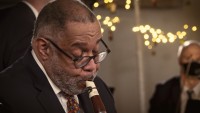Dr. Michael White, a multifaceted New Orleans clarinetist, bandleader, composer, musicologist, jazz historian, and educator, is celebrated as a leading authority on traditional New Orleans jazz. With over 50 recordings, international performances, and numerous accolades, he is a prominent figure in preserving and sharing the city's jazz heritage.
Raised in New Orleans' Carrollton neighborhood, Michael White's musical journey began with his aunt's influence, leading him to take up the clarinet in elementary school. Initially immersed in symphonic music and marching with the renowned St. Augustine Marching 100, he later discovered the vibrant world of New Orleans jazz at Jazz Fest in his late teens, inspiring him to embrace the local music.
His professional journey began in 1975, with his first gig as part of Ernest "Doc" Paulin's Brass Band during a church parade. He continued to perform in social club parades, jazz funerals, and alongside musicians like Danny Barker and George "Kid Sheik Cola."
A pivotal moment in the late 1970s came when White encountered a George Lewis recording, fueling his determination to become a New Orleans jazz clarinetist. He later dedicated an album, "A Song for George Lewis," to honor this musical hero. He drew inspiration from other clarinet legends, including Sidney Bechet, Johnny Dodds, Barney Bigard, Paul Barnes, and Willie Humphrey.
In 1981, White formed his first group, the Original Liberty Jazz Band, which regularly performs in New Orleans and held an annual residency at The Village Vanguard in New York. He also leads two smaller groups, the Liberty Brass Band and the Michael White Quartet. His affiliation with the Young Tuxedo Brass Band, founded by clarinetist John Casimir, allowed him to collaborate with traditional jazz veterans born between 1890 and 1910.
White's clarinet is featured on Wynton Marsalis' acclaimed 1989 album, "The Majesty of the Blues," and he has worked closely with Marsalis on various projects, including tributes to Jelly Roll Morton, King Oliver, and Sidney Bechet.
Throughout the 1990s, White recorded several albums with various record labels. In 2000, his partnership with Basin Street Records commenced, releasing much of his solo work. His discography includes "A Song for George Lewis," "Jazz from the Soul of New Orleans," "Dancing in the Sky," "Blue Crescent" (a post-Katrina reflection), "Adventures in New Orleans Jazz, Parts 1 & 2," and "Tricentennial Rag."
In 2005, he experienced the highs of an international tour with his band and the lows of Hurricane Katrina's devastation. His Gentilly home was flooded, resulting in the loss of historical memorabilia and music collections. Despite this, he channeled his emotions into "Blue Crescent," an album praised as a masterpiece of New Orleans traditional jazz.
White's multifaceted career extends beyond music. In 1980, he began teaching Spanish at Xavier University and was later awarded the Rosa and Charles Keller Jr. Endowed Chair in the Humanities, where he teaches African American Music. His educational contributions include workshops, guest coaching at Juilliard School of Music, and consultation for the New Orleans Jazz & Heritage Festival.
His achievements include being named Chevalier of Arts & Letters by the French government in 1995, receiving the 2008 Heritage Fellow of the National Endowment for the Arts, and earning the title of 2010 Louisiana Endowment for the Humanities Humanist of the Year. White has been awarded Clarinetist of the Year by Offbeat Magazine multiple times and won Best Traditional Jazz Artist of the Year at Gambit Magazine's Big Easy Awards in 2010. He received the Jazz Hero Award from the Jazz Journalists Association of America in 2015 and produced "New Orleans Brass Bands: Through the Streets of the City" for the Smithsonian Institution.
With a career spanning over three decades, Dr. Michael White remains an authoritative figure in New Orleans Jazz Music and an exemplary clarinetist contributing to the city's vibrant musical heritage.
Information Provided by Artist
























